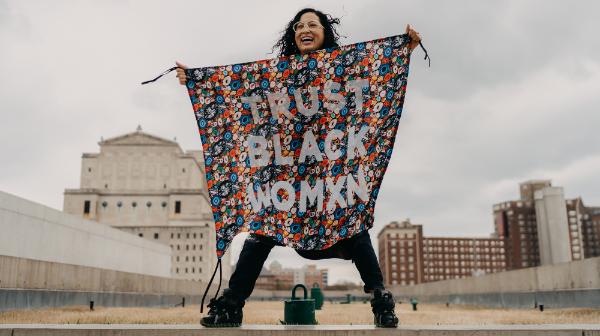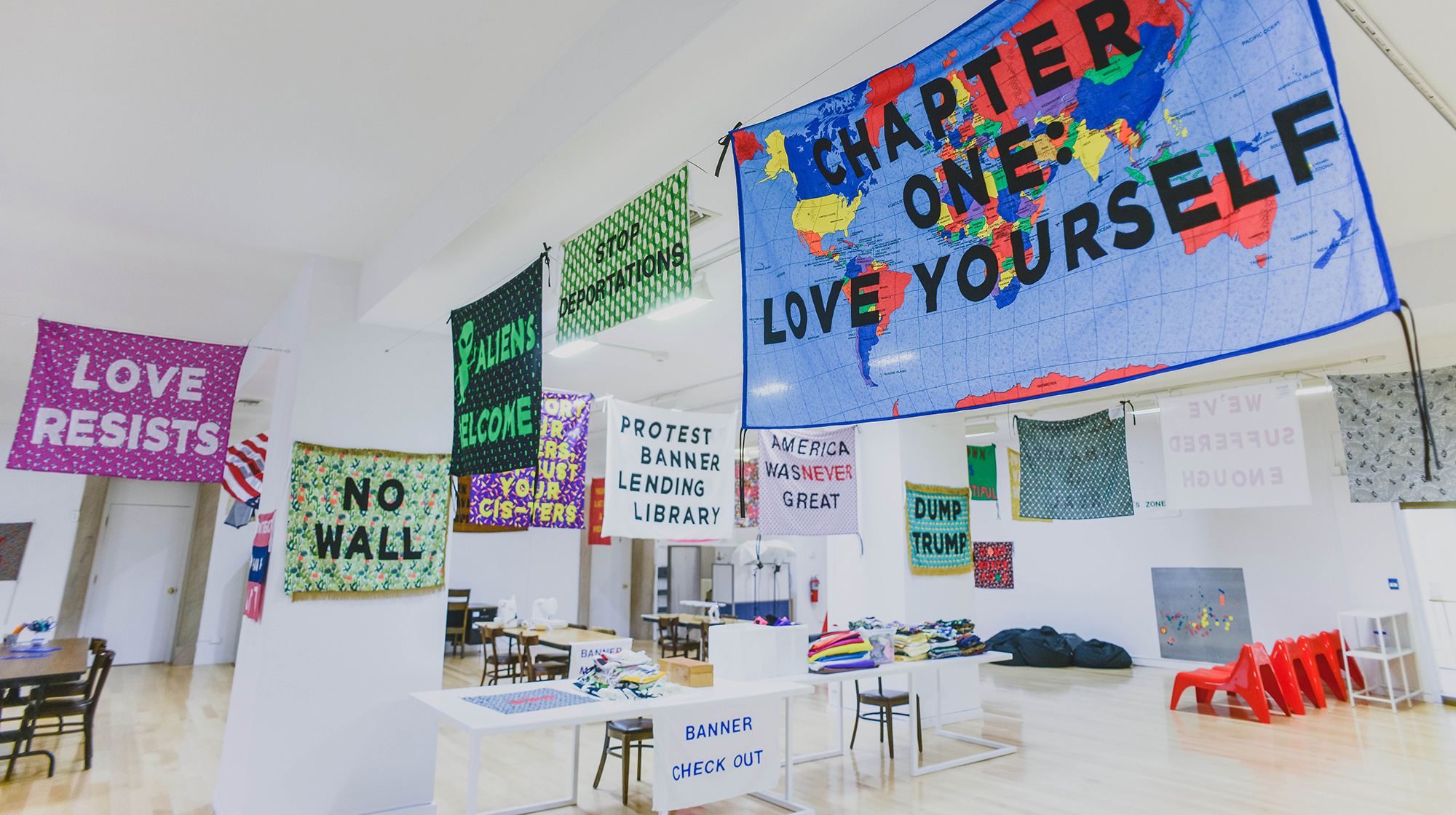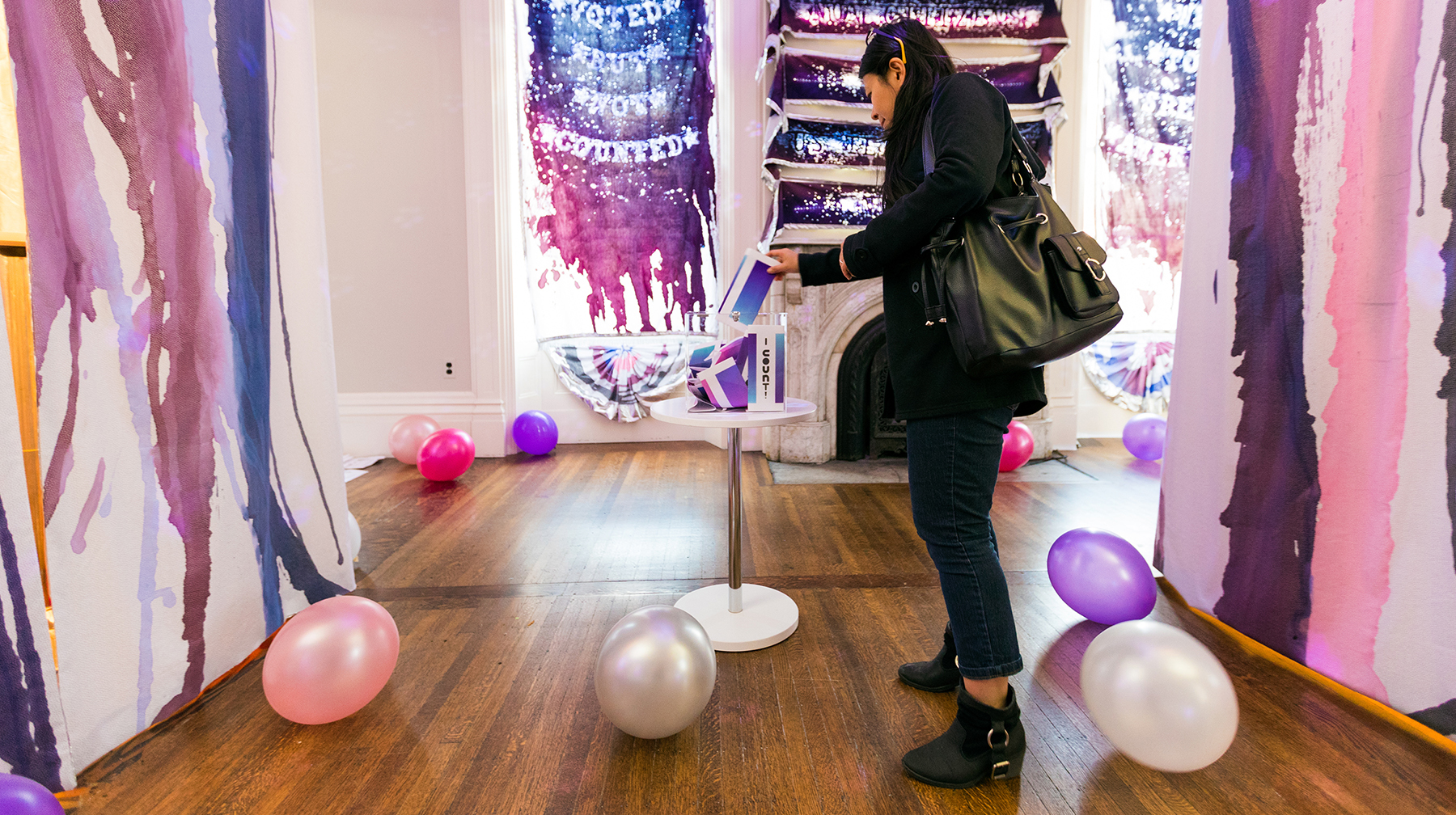Aram Han Sifuentes

Aram Han Sifuentes was 2020-2021 Artist-in-Residence in Fine Art. Han Sifuentes is a fiber and performance artist who works to claim spaces for immigrant and disenfranchised communities. Her work often revolves around skill sharing, specifically sewing techniques, to create multiethnic and intergenerational sewing circles, which become a place for empowerment, subversion and protest.
Solo exhibitions of her work have been exhibited at Jane Addams Hull-House Museum (Chicago, IL), Hyde Park Art Center (Chicago, IL), Chicago Cultural Center (Chicago, IL), Asian Arts Initiative (Philadelphia, PA), Table Art Center (Charleston, IL), University Galleries at Illinois State University (Normal, IL), and Pulitzer Arts Foundation (St. Louis, MO). Her solo exhibition, Talking Back to Power, will be on exhibit at the Skirball Cultural Center (Los Angeles, CA) October 2020 to March 2021.

Aram Han Sifuentes is called to use her art practice for social justice:
"As an immigrant and daughter of a seamstress, I learned to sew at age six. It was not a choice but rather a necessity to help my mother earn of living. In this way, sewing has ever since been an important part of me, my body memory, and my politics. Sewing is my medium to investigate identity politics, immigration and immigrant labor, possession and dispossession, citizenship and belonging, dissent and protest, and race politics in the United States. My art practice situates itself at the intersection of fiber, social practice, performance, and pedagogy. At the core of my practice, I create socially engaged and materially rich projects in an ‘art world’ environment that are available and accessible for those who are disenfranchised, particularly for dispossessed immigrants of color."
Han Sifuentes is a 2016 Smithsonian Artist Research Fellow, 2016 3Arts Awardee, and 2017 Sustainable Arts Foundation Awardee. Her project Protest Banner Lending Library was a finalist for the Beazley Design Awards at the Design Museum (London, UK) in 2016. She earned her BA in Art and Latin American Studies from the University of California, Berkeley, and her MFA in Fiber and Material Studies from the School of the Art Institute of Chicago.

At Loyola University, Han Sifuentes shared her social and intersectional practice with students and University community. During Fall 2020, she taught Fine Arts 393: Official Unofficial Voting Station: Voting for All Who Legally Can't. This interdisciplinary fine arts course engaged students in creating their own materially rich imaginative voting stations for the 2020 election season. The class explored social practice and socially engaged art, ethics of community collaborations, and the role of art in social justice through the use of various art mediums such as fiber and textiles, performance, sculpture and other formats.
In Spring 2021, Han Sifuentes organized the exhibition Let Us Vote! Voting for All Who Legally Can’t at the Ralph Arnold Gallery on Loyola’s Lakeshore Campus.
According to the U.S. Election Project, in 2016 28.6% of Americans, equating to 92 million people, were disenfranchised and ineligible to vote in the presidential elections. The Official Unofficial Voting Station is an art project that creates symbolic voting events, performances and art installations for those whose votes are suppressed due to disenfranchisement. Disenfranchised groups include youth under 18, non-citizens, incarcerated and ex-felons (depending on state laws), residents of U.S. territories, and those without government issued I.D.s (depending on state laws).
What can voting look like if it were more accessible? What can voting look like if the disenfranchised could be the ones to determine what shows up on the ballots? Ballots and ephemera from the 2020 Official Unofficial Voting Stations will be on view in addition to Loyola student projects created in FNAR 393. Official Unofficial Voting Station is a site of empowerment, site for protest, site for sharing resources, site for social engagement and discussion, and is a collective art project making disenfranchisement visible and fighting against it in the United States.

Aram Han Sifuentes was 2020-2021 Artist-in-Residence in Fine Art. Han Sifuentes is a fiber and performance artist who works to claim spaces for immigrant and disenfranchised communities. Her work often revolves around skill sharing, specifically sewing techniques, to create multiethnic and intergenerational sewing circles, which become a place for empowerment, subversion and protest.
Solo exhibitions of her work have been exhibited at Jane Addams Hull-House Museum (Chicago, IL), Hyde Park Art Center (Chicago, IL), Chicago Cultural Center (Chicago, IL), Asian Arts Initiative (Philadelphia, PA), Table Art Center (Charleston, IL), University Galleries at Illinois State University (Normal, IL), and Pulitzer Arts Foundation (St. Louis, MO). Her solo exhibition, Talking Back to Power, will be on exhibit at the Skirball Cultural Center (Los Angeles, CA) October 2020 to March 2021.

Aram Han Sifuentes is called to use her art practice for social justice:
"As an immigrant and daughter of a seamstress, I learned to sew at age six. It was not a choice but rather a necessity to help my mother earn of living. In this way, sewing has ever since been an important part of me, my body memory, and my politics. Sewing is my medium to investigate identity politics, immigration and immigrant labor, possession and dispossession, citizenship and belonging, dissent and protest, and race politics in the United States. My art practice situates itself at the intersection of fiber, social practice, performance, and pedagogy. At the core of my practice, I create socially engaged and materially rich projects in an ‘art world’ environment that are available and accessible for those who are disenfranchised, particularly for dispossessed immigrants of color."
Han Sifuentes is a 2016 Smithsonian Artist Research Fellow, 2016 3Arts Awardee, and 2017 Sustainable Arts Foundation Awardee. Her project Protest Banner Lending Library was a finalist for the Beazley Design Awards at the Design Museum (London, UK) in 2016. She earned her BA in Art and Latin American Studies from the University of California, Berkeley, and her MFA in Fiber and Material Studies from the School of the Art Institute of Chicago.

At Loyola University, Han Sifuentes shared her social and intersectional practice with students and University community. During Fall 2020, she taught Fine Arts 393: Official Unofficial Voting Station: Voting for All Who Legally Can't. This interdisciplinary fine arts course engaged students in creating their own materially rich imaginative voting stations for the 2020 election season. The class explored social practice and socially engaged art, ethics of community collaborations, and the role of art in social justice through the use of various art mediums such as fiber and textiles, performance, sculpture and other formats.
In Spring 2021, Han Sifuentes organized the exhibition Let Us Vote! Voting for All Who Legally Can’t at the Ralph Arnold Gallery on Loyola’s Lakeshore Campus.
According to the U.S. Election Project, in 2016 28.6% of Americans, equating to 92 million people, were disenfranchised and ineligible to vote in the presidential elections. The Official Unofficial Voting Station is an art project that creates symbolic voting events, performances and art installations for those whose votes are suppressed due to disenfranchisement. Disenfranchised groups include youth under 18, non-citizens, incarcerated and ex-felons (depending on state laws), residents of U.S. territories, and those without government issued I.D.s (depending on state laws).
What can voting look like if it were more accessible? What can voting look like if the disenfranchised could be the ones to determine what shows up on the ballots? Ballots and ephemera from the 2020 Official Unofficial Voting Stations will be on view in addition to Loyola student projects created in FNAR 393. Official Unofficial Voting Station is a site of empowerment, site for protest, site for sharing resources, site for social engagement and discussion, and is a collective art project making disenfranchisement visible and fighting against it in the United States.
